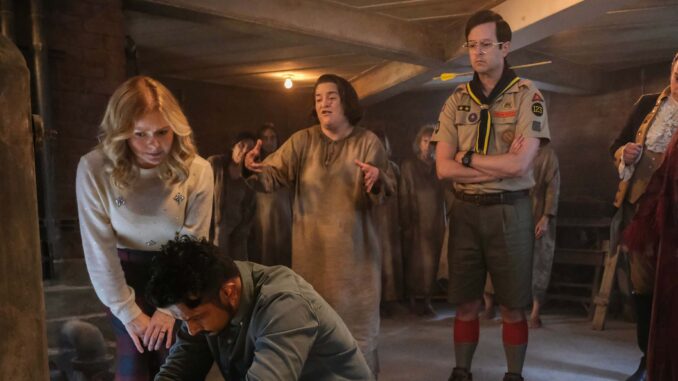
Season 5 of Ghosts: Unearthing the Unseen – The Unlikely Saga of Ralph
The success of Ghosts lies not just in its ingenious premise and hilarious ensemble, but in its profound capacity to peel back the layers of history, revealing the hidden depths and poignant humanity of its spectral inhabitants. Each main ghost, from the flamboyant Alberta to the uptight Isaac, has had their moment in the sun, their untold stories meticulously woven into the fabric of the show. Yet, the sprawling Woodstone estate holds many more secrets, many more spectral residents whose backstories remain largely opaque, serving as comedic relief or atmospheric texture rather than fully fleshed-out characters. Season 5, in a stroke of narrative genius, promises to change this, unearthing the untold story of a character so surprising, so often overlooked, that their revelation will redefine not just their own place, but the very dynamics of the house: Ralph, the perpetually naked, often-belligerent basement ghost.
From his first appearance, tumbling into view with a splash and a primal yell, Ralph has been the epitome of the "other" – the wild, uncouth, and often naked resident of the mansion's grimy basement. He and his fellow subterranean spirits exist in a state of perpetual annoyance to the upstairs contingent, a cacophony of primitive needs and crude gestures. Ralph, with his limited vocabulary, unkempt appearance, and seemingly boundless capacity for yelling about "food!" or "fire!", has been portrayed as little more than a living (or rather, un-living) caricature of base human instinct. He is dismissed, patronized, and occasionally endured, but never truly seen as an individual with a past, a purpose, or a story beyond the muddy well that claimed him. His presence is a constant, low-level irritation, a stark contrast to the refined or dramatic lives of the "main" ghosts.
Season 5, however, rips away this simplistic veneer, revealing a past so unexpectedly rich and tragically noble that it recontextualizes every grunt and every primal scream Ralph has ever uttered. The catalyst for this revelation is, fittingly, Sam, who stumbles upon an obscure local legend while researching a peculiar historical anomaly related to the Woodstone estate's original water source. Through a series of dusty ledgers and forgotten community records, Sam uncovers the story of Ralph Alcott, not as a simple peasant who accidentally fell down a well, but as a brilliant, self-taught hydrologist and engineer in the early 19th century.
Ralph Alcott, it turns out, was a visionary from humble beginnings, deeply concerned with the public health of the impoverished local community, which suffered from contaminated water. Driven by a desire to provide clean, accessible water, he devised an innovative, subterranean aqueduct system, far ahead of his time, that would draw from a pure, underground spring miles away. This audacious project, however, directly threatened the profits of established, wealthy landowners who monopolized the existing, often unsanitary, water supply. They saw his work as a dangerous disruption, not a benevolent act. On the night of his death, Ralph wasn't simply "falling into a well"; he was meticulously mapping and inspecting a crucial junction of his nascent aqueduct system, working covertly under the cover of darkness. He was sabotaged, his carefully constructed platform deliberately weakened, causing him to plummet to his death, his ambitious plans buried with him, literally and figuratively. His project was shelved, his name slandered, and his innovations attributed to more "respectable" figures years later. The well wasn't just his grave; it was the tomb of his dreams for a healthier community.
This profound revelation shatters the preconceived notions of every ghost in Woodstone Manor. Isaac, initially dismissive of the "grubby basement dweller," is forced to confront his own class snobbery and recognize a fellow intellectual, albeit one from a vastly different social stratum. Hetty, the grande dame, is mortified to realize that her ancestors, who owned the land, might have been complicit in suppressing Ralph's vital work for their own gain. Alberta, a champion of the underdog, feels a surge of righteous anger on Ralph's behalf, recognizing the injustice of his silenced legacy. Even Trevor, often superficial, finds himself surprisingly moved by the story of a man stripped of his dignity and achievement.
The impact on Ralph himself is perhaps the most poignant. Initially, the details of his past are painful, dredging up the humiliation and injustice he endured. But as Sam brings his story to light, and the upstairs ghosts – with newfound respect – begin to acknowledge his contributions, a subtle shift occurs. The constant "food!" and "fire!" might still be there, but now, occasionally, there's a flicker of the sharp mind, a glint of the determined spirit that once designed a better future. He might never fully articulate the complexity of his past, but the understanding from others, the recognition of his worth, offers him a form of posthumous redemption, lifting him, if only emotionally, from the ignominy of the well.
Ralph's untold story serves as a powerful testament to Ghosts' enduring themes: the hidden lives of those deemed insignificant, the weight of historical injustice, and the transformative power of empathy. It reminds us that every individual, no matter how they appear or how long they've been misunderstood, carries a universe of experience, ambition, and tragedy within them. By giving a voice to the voiceless, and a history to the seemingly mundane, Season 5 doesn't just reveal the untold story of a surprising character; it deepens our understanding of the entire spectral ecosystem of Woodstone Manor, proving that even in the most unlikely of places, greatness can be found, waiting patiently to be unearthed.